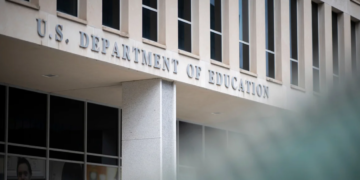April 12, 2025 Story by: Publisher
The Legal Defense Fund’s (LDF) Thurgood Marshall Institute (TMI) released a new report, Black Educators as Essential Workers for Educational Equity, that uses the experiences of Black public-school teachers to inform policy recommendations for promoting and advancing educational equity in elementary, middle, and high schools.
The report comes at a pivotal moment of increasing threats to public education to reaffirm the critical importance of championing a diverse educator workforce prepared to promote the success of all students.
“Amid imminent attacks on public education, including an Executive Order instructing Secretary McMahon to facilitate the closure of the U.S. Department of Education, this report comes at a critically important time in which our efforts to protect and advance educational equity will largely decide the future success of our nation’s students,” Karla McKanders, Director of the Thurgood Marshall Institute said. “Black educators are uniquely positioned to engage and understand the specific gaps and opportunities of the public education system, and research has shown that Black educators are associated with increased educational outcomes for Black and white students alike.”
Using data from interviews with 30 Black educators who taught in K-12 public schools in the 2020-2021 school year, the report emphasizes the importance of ensuring all students can succeed in American classrooms while uplifting the critical perspectives of Black educators in advancing these efforts.
From the interviewees insights, TMI researcher Dr. Kesha Moore developed six keys of educational equity: (1) teaching resilience skills to help students navigate individual and institutionalized racism; (2) developing a trusting relationship with students as a prerequisite to teaching; (3) restructuring the curriculum to engage students’ identity and social context; (4) advocating at individual and institutional levels for racial equity within schools; (5) supporting vulnerable families within the school community; and (6) using a supportive, trauma-informed approach to student behavioral problems instead of punishment.
“The influential roles that Black educators play in our students’ educational trajectories cannot be overstated,” Dr. Kesha Moore, Research Manager at the Thurgood Marshall Institute said. “Black educators have invaluable insights as it relates to ensuring Black and non-Black students’ success—including teaching resilience skills in combatting racism and trauma-informed approaches in addressing student behavioral problems. Education decision-makers and the broader public should recognize the deep significance of Black educators’ voices, needs, and experiences in order to effect positive change within the public education system.”
The Black Educators as Essential Workers for Educational Equity report makes the following policy recommendations to improve educational equity in K-12 institutions:
- restructure school discipline practices to replace punishment models with more positive, supportive models that address the material, social, and emotional needs shaping student behavior
- acknowledge and reward educators with a demonstrated history of advancing educational equity
- extend opportunities and resources to current and future educators who prioritize educational equity
- involve Black educators in developing diverse, culturally responsive curriculum and education policies at the national and local levels
- address workplace discrimination against Black educators.
The full report can be found here.
Source: Legal Defense Fund

















